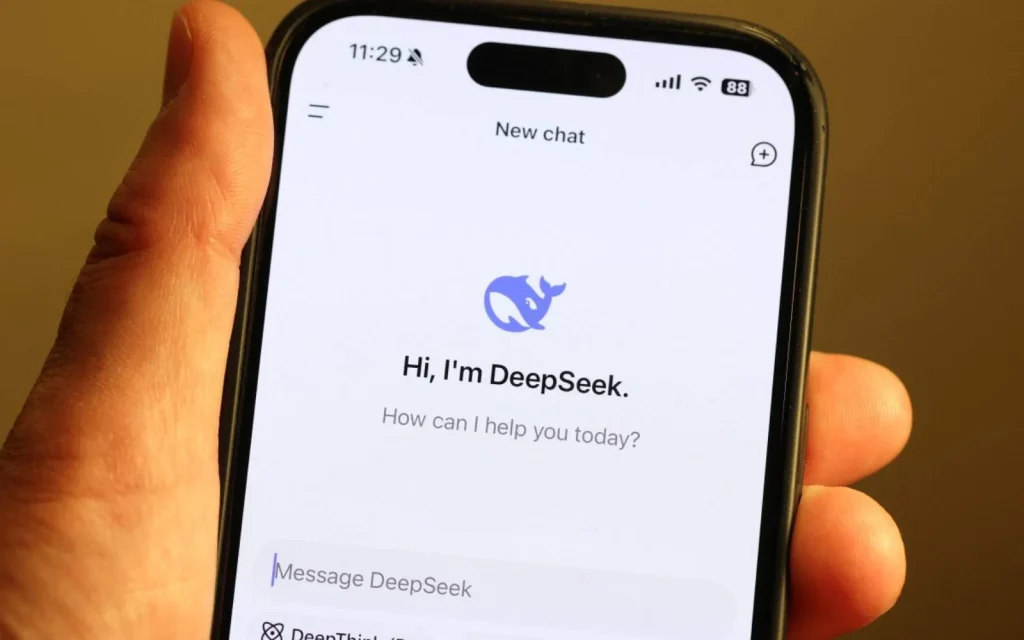Artificial intelligence is at the heart of the technological revolution, and in recent months, one name has begun to resonate in the headlines: DeepSeek. This AI, developed in China, has not only surprised with performance comparable to giants like ChatGPT, but also with its low-cost model, which has generated a mixture of admiration and controversy. In this article we explore everything you need to know about DeepSeek and its global impact.
What is DeepSeek?
DeepSeek is an artificial intelligence (AI) platform developed by a Chinese startup that has burst onto the global market. Its main goal is to offer advanced AI solutions at radically reduced costs, democratising access to technologies such as natural language processing (NLP), automated content generation, predictive analytics and more. What sets DeepSeek apart is its ability to compete with Western giants such as OpenAI or Google, but with a business model that prioritises affordability and technical efficiency.
For exampleIn comparative tests between DeepSeek and ChatGPT, it was observed that DeepSeek can generate similar quality content with 40% less computational resource consumption. This not only makes it more accessible to small and medium-sized businesses, but also opens up opportunities in emerging markets where cost is often a barrier. Moreover, while subscribers to other platforms must pay monthly fees of between 20 and 50 dollars, DeepSeek offers plans starting as low as 5 dollars, which has had a notable impact on its global adoption. However, it has also been criticised for censorship and control over its responses, which are aligned with Chinese government policies.
Markets such as Southeast Asia, Africa and Latin America, which face economic and technological infrastructure constraints, could benefit enormously. In these regions, the implementation of accessible AI has the potential to transform key sectors such as education, agriculture and healthcare, optimising processes and significantly reducing costs.
The platform includes tools such as DeepSeek-R1 (a language model specialised in business tasks) and DeepSeek-v2 (an enhanced version with greater multi-modal processing capabilities). It has also ventured into areas such as cryptoeconomics, offering blockchain solutions integrated with AI.
Who is behind DeepSeek?
DeepSeek is a project led by a team of Chinese engineers and data scientists, many with experience at leading tech companies such as Alibaba, Tencent and Baidu. Although the company keeps a low profile in terms of its investors and strategic alliances, it is rumoured to have indirect support from the Chinese government, especially because of its alignment with national goals to master AI by 2030.
However, the startup has avoided disclosing details about its funding, which has led to speculation about whether it operates with private capital, state subsidies or even funds linked to the defence industry. This opacity has been both an advantage (avoiding international sanctions) and a source of distrust for the West. Although it apparently has fewer resources than giants such as OpenAI, it has achieved surprising results.
In a recent interview, it was pointed out that DeepSeek has achieved this without access to advanced hardware that is banned in China due to international restrictions. This detail fuels speculation about what backing it might have from the government or state-owned technology companies.
What can I do with DeepSeek?
The applications of DeepSeek are vast:
- Content generationCreate articles, scripts or social media posts in seconds.
- Business automationOptimise logistical processes, customer service through chatbots or predictive financial analysis.
- Research: Accelerate scientific studies with data mining and simulation tools.
- Crypto and blockchainDevelop smart contracts, analyse cryptocurrency markets or manage DAOs (Decentralised Autonomous Organisations).
- EducationPersonalise learning materials or virtual tutorials.
Además, DeepSeek se promociona como una alternativa «low-cost» a soluciones como ChatGPT o Gemini, ideal para pymes o países en desarrollo, como comentamos anteriormente. Sin embargo, también se ha reportado que DeepSeek limita las respuestas sobre temas considerados sensibles por el gobierno chino, lo que puede ser un obstáculo en ciertos contextos.
How to download DeepSeek R1?
DeepSeek-R1 is available for download via the company's official website (www.deepseek.com), although access varies by region. Due to geopolitical restrictions, users in the US or EU may need VPNs to download it. The process is straightforward:
- Register with an email address.
- Select the model (R1 or v2).
- Download the software, which requires a CUDA-compatible graphics card (NVIDIA) or cloud resources.
Some countries have blocked the service over security concerns, citing risks of cyber espionage.
There is speculation that an international version could be launched in the future, which could open the door to adoption in key markets such as Europe and Latin America. However, such a move would be conditional on political agreements related to tensions between China and other nations, as well as commercial acceptance of a low-cost model that competes directly with Western solutions. In addition, international implementation could influence privacy and security standards, issues that are already the subject of intense debate in the global technology arena.
What happened to DeepSeek? Latest news
- Impact on Western stock marketsDeepSeek's breakthrough has caused volatility in US tech companies. After the announcement of the Stargate project ($500 billion for AI in the US), the Chinese startup showed it could match results with a fraction of the budget, causing shares such as NVIDIA and Alphabet to fall.
- Hardware vetoThe US has extended restrictions on the export of advanced chips to China, but DeepSeek has circumvented this by using recycled hardware and optimised algorithms.
- DeepSeek in EnglishThe company recently launched Spanish-language models, targeting Latin American markets and Spain, which has increased its user base by 300%.
Its emergence has unsettled traditional competitors, such as OpenAI and Google, whose shares have fallen by as much as 15% in some key weeks following DeepSeek's announcement. In addition, Chinese companies such as Tencent and Baidu have seen significant increases in their values, evidencing the positive impact for local players. The key to their success seems to be their business model based on efficiency and low cost, which has allowed them to quickly capture market share in sectors such as education and digital commerce.
DeepSeek and cryptocurrencies
The company has launched its own token, DSEEKon platforms such as Binance and Coinbase. This cryptoasset is used to access premium services in its ecosystem (e.g. increased processing power) and has gained 120% in value in 2024. However, European regulators are investigating whether DSEEK could be used to evade economic sanctions.
Exclusive InterviewDeepSeek Impact Analysis
David Sanz, expert and professor at the Master in Artificial Intelligence & Data in IMMUNE
Interviewer: How do you think DeepSeek will affect the market - will people prioritise low cost over security?
Expert: Es complicado… El impacto ha sido crítico. Todos los que invirtieron en IA occidental han sufrido un descalabro en bolsa. Nadie esperaba una irrupción tan salvaje. DeepSeek compite con modelos occidentales pero cuesta casi nada, como si alguien vendiera un iPhone a 30 dólares. ¿Cómo compites contra eso?
The big question is: will users be discerning if their data is used by the Chinese government? But, look at TikTok: everyone uses it despite the risks. I think cheapness will outweigh ethics. DeepSeek is a revolution, but also a wake-up call: are we burning too many resources in the West? Maybe we should learn from its efficiency.
Conclusion
The second version of DeepSeek, known as DeepSeek-v2, is already in development and promises significant improvements in accuracy, speed and multilingual capabilities. This version is expected to address some of the current criticisms, including censorship.
DeepSeek represents a disruptive change in the world of artificial intelligence. As highlighted by our expert:
"DeepSeek is here to create a revolution. Its model is forcing competitors to rethink the efficiency and resources they employ".
While the world debates cost and ethics, one thing is clear: DeepSeek has opened a new stage in the race for global AI dominance.
DeepSeek es un símbolo de la pugna tecnológica entre China y Occidente. Su modelo «low-cost» está redefiniendo el mercado, pero plantea dilemas éticos y de seguridad. Mientras algunos ven una oportunidad para democratizar la IA, otros alertan sobre un nuevo capítulo en la guerra fría digital. Una cosa es segura: ignorar a DeepSeek ya no es una opción.
Are you ready to be part of this change?

